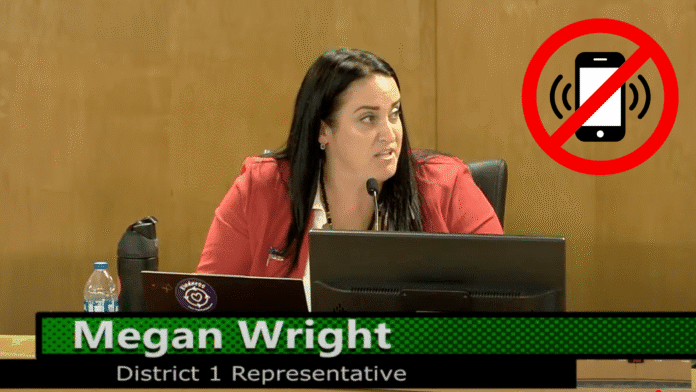In a contentious 4-1 vote during Tuesday night’s school board meeting, the Brevard Public Schools Board approved revisions to Policy 5136, implementing a sweeping ban on wireless communication devices (WCDs) for all students from kindergarten through 12th grade. The policy, which extends beyond Florida state law’s requirements for grades K-8 by including high schools, mandates that devices—including cell phones, laptops, iPads, smartwatches, and similar electronics—must be powered off and stored out of sight from the first bell to the last dismissal bell, with no exceptions during the school day.
The decision, championed by board member Megan Wright, comes after months of discussion but has sparked immediate backlash from students, parents, and even some board members who highlighted unintended consequences and procedural irregularities. While the policy won’t officially take effect for 30 days, schools have already begun enforcing similar rules outlined in the previously approved student code of conduct, leading to widespread confusion among families and staff about what rules are currently in place and what changes might be forthcoming.
Opposition from Students and Parents: Calls for Balance and Real-World Preparation
Public comments during the meeting were dominated by opposition, with students and parents articulating concerns that the policy overreaches, stifles academic progress, and fails to prepare teens for adulthood. Many argued that while curbing distractions during instructional time is reasonable, a blanket ban ignores the educational value of personal devices and punishes responsible users.
One poignant example came from Ava Newman, a senior at Satellite High School and a dedicated orchestra student. Newman described how she relied on her phone’s tuning app and metronome during individual practice sessions, tools that helped her improve from an “inexperienced player” to a more proficient musician. “Banning phones in high school levels can be detrimental to a lot of teachers and students when it comes to the tools needed for that development,” she said, noting that teachers shouldn’t have to purchase expensive alternatives like manual tuners (averaging $50 for a decent one) or stopwatches for physics classes. She questioned the board’s logic: “You’re denying phones to juniors and seniors who are on their way to adulthood. Actually, most seniors are turning 18 real soon. You’re telling me my peers could get sent to war but not use a cell phone in class?”
Other speakers echoed this, emphasizing equity and accessibility issues. A parent highlighted how the ban could exacerbate inequities for students with Individualized Education Programs (IEPs) or 504 plans, such as those with dyslexia who need e-readers for adjustable fonts or audio books. “You could very easily end up in a place where students with an IEP have access to technology items in class and the other students don’t,” the parent warned, calling it a form of “inequity.”
Students like one high schooler stressed preparation for college, where “nobody uses paper and pencil because it is impractical.” She argued that prohibiting personal laptops or iPads for note-taking on digital slideshows hinders future readiness: “Forcing us to not use all of the tools that we are so lucky to have is negatively affecting our future.” Another speaker pointed out operational inefficiencies, such as wasting class time on slow school computers—citing an instance where 20 minutes of a period were lost to logins and bathroom pass issues.
Parents also raised social and safety concerns. One mother shared her daughter’s observation that “tensions against adults during lunch are already rising” without devices for decompression through music, reading, or studying. A teacher’s quote was invoked: “Bored kids get in trouble. They’ll fight just to fight.” Critics argued the policy targets “the smart kids” trying to advance, rather than holding “troublemakers accountable,” and could delay cyberbullying issues until after school or in person.
Jennifer Nai, a parent from Edgewood Junior/Senior High School, criticized the disproportionate discipline: a three-day suspension for a third phone offense versus one day for vaping (without THC). “Our kids, the ones who are going to get in trouble, are the kids who are like taking notes and trying to work on stuff during lunch hour on their computers,” she said, hoping for discussion before approval.
These points highlighted a common theme: the policy is a “knee-jerk reaction” that removes principal discretion, lumps high schools with elementary rules, and ignores the Space Coast’s tech-driven economy, where skills in CAD, coding, and aerospace programs require robust digital tools.
Kayte Campbell’s Correction of Megan Wright: An Embarrassing Moment for the Policy’s Champion
A particularly awkward exchange unfolded when board member Kayte Campbell, a consistent opponent of the strict ban, had to correct Megan Wright— the policy’s primary advocate—on key details of its implementation and process. Wright, defending the changes, asserted that the policy “hasn’t been approved yet, so it’s not actually in place,” dismissing complaints as premature and noting a planned “grace period” for communication.
Campbell swiftly interjected with clarifications: “Schools are communicating this out… because there is something we’ve already voted on, we’ve already approved, and that is the student code of conduct. All of this language is in the code of conduct.” She explained that schools are already enforcing the rules to avoid a “bait and switch” later, even if formal consequences begin September 2. This moment highlighted Wright’s apparent misunderstanding of how the policy intertwined with the code of conduct, which the board had approved earlier.
The correction was especially embarrassing given Wright’s role in pushing the revisions. She had earlier gone “on a soap box” to champion the ban, arguing it would eliminate distractions like TikTok videos in hallways and create productive environments. Wright likened school without phones to family vacations without service, where her own children reportedly thrived. However, her insistence that the policy wasn’t yet active clashed with on-the-ground realities, undermining her authority as the lead proponent and exposing gaps in the board’s communication strategy. You can watch that exchange in the time-stamped video below:
John Thomas’ Push to Table: Concerns Over Unintended Consequences
Board member John Thomas emerged as a voice of caution, proposing to table the policy for a month to “fully investigate if there’s unintended consequences.” Initially supportive of “zero tolerance,” Thomas reconsidered after hearing testimony about laptops and iPads. “I would hate for us to approve this and then we’re dealing with unintended consequences,” he said, referencing successful implementations in counties like Orange but stressing the need for Brevard-specific adjustments.
Thomas clarified his stance wasn’t about allowing cell phones but ensuring the ban didn’t inadvertently hinder academic tools. He suggested amending the motion to restore principal discretion for iPads and laptops during instructional time, but procedural rules—requiring a 28-day delay for changes—prevented it. His desire to table stemmed from a pragmatic fear: rushing approval could lead to rushed fixes later, especially since the old policy allowed discretion that was allegedly abused but not uniformly enforced.
Procedural Conflicts and Matt Susin’s Apparent Reluctance
The meeting revealed deeper procedural tensions, including conflicts between the policy’s timeline, the student code of conduct, and state rulemaking requirements. Approving changes triggers a 30-day wait before effectiveness, but the code of conduct’s existing language means schools are already acting, creating a mismatch. Tabling or rejecting would reset the 90-day rulemaking window, potentially leaving inconsistencies that “wouldn’t be the first time” but could complicate enforcement.
Board member Matt Susin appeared torn, acknowledging flaws in the policy while voting yes alongside allies Wright and Gene Trent. Susin praised the ban’s early benefits, like louder, more interactive lunch periods and students requesting board games, citing cell phones’ “negative consequences on social emotional healing, brains, everything else.” Yet, he agreed with critics on laptops/iPads, sharing anecdotes from schools where students complained about malfunctioning district devices: “My laptop from the school is not working… so how do we do it? And that’s a problem.”
Susin advocated passing the policy then immediately workshopping revisions, questioning resource allocation for better school tech. His vote suggested alignment with the ban’s core but hesitation on its breadth—possibly influenced by reluctance to break from Wright and Trent, who staunchly defended it. This dynamic hinted at internal alliances overriding full consensus, with Susin committing to fixes but not risking a “nay” vote.
Confusion Rippling Through Families and Staff
The board’s decision and the meeting’s revelations have sown confusion among families and staff. Schools are preemptively enforcing the ban via the code of conduct, leading to reports of teacher stress— one mistook a wallet for a phone, fearing termination—and student tensions rising after just two days. Parents like one who noted her daughter’s teachers turning to students to speak out (due to fear of reprisal) worry about uneven enforcement and unclear grace periods.
With the board pledging a workshop to potentially carve out exceptions for academic devices, families face uncertainty: Will rules change mid-implementation? Staff, already navigating the policy’s rollout, may grapple with shifting directives. As one parent put it, the lack of “community input” and surveys has left decisions feeling made “in a vacuum,” amplifying frustration in a district still adapting to the school year’s start.
po5136-Wireless-Communication-Devices-proposed-revisions-1










